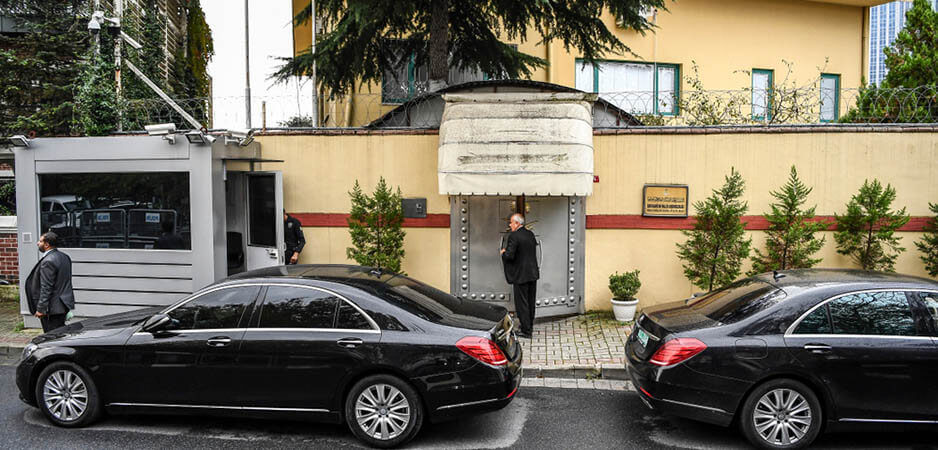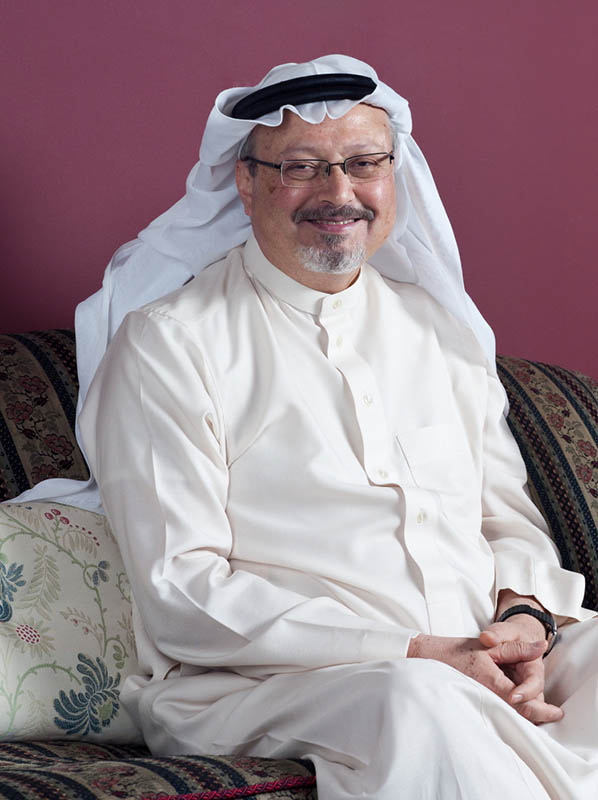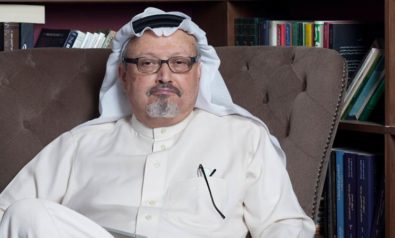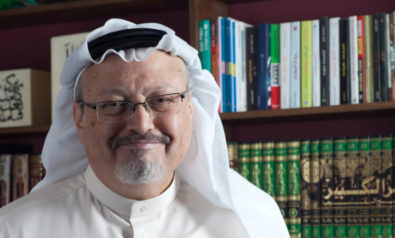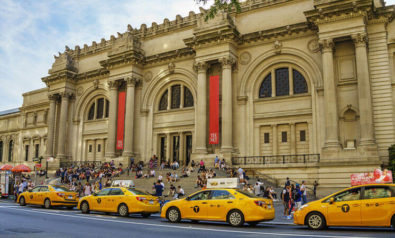In his last ever article, Jamal Khashoggi lamented the lack of an “independent international forum” and “transnational media” in the Arab world.
In his final, posthumous column published by The Washington Post, Saudi journalist Jamal Khashoggi complained about the public’s general acceptance of attacks by governments in the Arab world on freedom of the press. They are so frequent and widespread that the public has become inured and indifferent. “These actions no longer carry the consequence of a backlash from the international community,” he wrote. “Instead, these actions may trigger condemnation quickly followed by silence.”
When the press first began to speak of Khashoggi’s failure to appear after a visit to the Saudi Consulate in Istanbul, many in the media expressed their alarm and ran stories about it for two or three days and then began to go quiet when, following Saudi denials of any knowledge of Khashoggi’s fate, no further news was forthcoming. The pattern seemed confirmed. The world would move on to other dramas.
But the mystery deepened with the continued insistence of the Saudis that they knew nothing and had nothing to report, including the basic facts about how and when he left the consulate, as they claimed. Then, probably to the Saudis’ own surprise, the Turkish authorities revealed that they had evidence not only that the journalist had never left the consulate, but that he was most likely murdered inside the consulate.
Now the media had something to work with. Embarrassed by the revelation, the Saudis had a brief opportunity for damage control by admitting partial responsibility (i.e., the “botched interrogation” suggested some days later). All they needed to do would be to place the blame on a designated subordinate — the standard procedure of “plausible deniability. But by then they may have realized that the degree of toxicity of the event was such that the only viable strategy would be to continue stonewalling, hoping that Khashoggi’s own insight was correct, that his murder would simply “trigger condemnation quickly followed by silence.”
The unraveling of Donald Trump’s Middle East gambit?
This is where US President Donald Trump may have been unwittingly responsible for the definitive undermining of the reputation of Saudi Crown Prince Mohammed bin Salman (MBS), on whom Trump, or rather Jared Kushner, has based his grand vision of a new Middle East led by Israel and Saudi Arabia, with Iran neutralized after regime change or simply reduced to rubble. By failing to join one of his most vocal supporters, Republican Senator Lindsey Graham, in expressing his moral indignation and forcing the Saudis to admit some level of accountability — if only to stabilize the increasingly embarrassing situation caused by their blanket denial — Trump has revealed to the world how focused his own values are on money and power to the exclusion of justice and human rights. He has run the risk of potentially splitting the fragile unity he had created in the Republican Party around his bombastic personal power.
As we wait to see the chain reaction of future events once the already evident facts are brought out into the open, observers will focus on how three threads of the story will play out: the damage inside Saudi Arabia to Mohammed bin Salman’s hold on power (after all he is “only” the crown prince); the damage done to Trump within in his party and to his party during the midterm elections in November; and the fate of the notorious peace plan for Palestine and Israel, engineered by Kushner which, according to reports, included a major role for Saudi Arabia.
After first speculating that there may have been “rogue killers,” which most observers believed was an allusion to the “botched interrogation” thesis, Trump has finally admitted that he “believes Jamal Khashoggi is dead.” He also tellingly revealed his disappointment that the story has remained in the public spotlight longer than he and MBS hoped or expected: “This one has caught the imagination of the world, unfortunately.” In an act of uncharacteristic patience, Trump now insists on waiting for the outcome of three investigations before making a “strong statement,” possibly in the hope that in the meantime Kanye West and Kim Kardashian will have drawn “the imagination of the world” to a more exciting subject.
Trump’s willingness to passively support as long as possible the Saudis’ stonewalling illustrates Khashoggi’s concern that the international community was no longer capable of providing the “backlash” he felt was necessary to drive a wedge in Saudi Arabia’s despotic control of the press. As more and more economic partners, international firms and European ministers turn away from their commitment to the glitzy Future Investment Initiative in Saudi Arabia, something resembling a backlash finally seems to be taking place.
If the backlash continues to capture not just the imagination but also the moral indignation of the world, Khashoggi’s martyrdom may turn out to be a blow for freedom, opening a slight but possibly growing breach in the authoritarian control of the media that MBS has exercised. Could the journalist’s murder be for Saudi Arabia what the immolation of Mohamed Bouazizi was for Tunisia’s Arab Spring in 2010? That seems unlikely, given the nature and the sheer wealth of the interests in place, but symbols and acts of martyrdom have been known to change the course of history, particularly in the Middle East.
How free is any press?
Describing how the media is manipulated in the Arab world, Jamal Khashoggi tells us: “[T]hese governments, whose very existence relies on the control of information, have aggressively blocked the Internet. They have also arrested local reporters and pressured advertisers to harm the revenue of specific publications.”
In the West it’s different, but only by a degree. As this author recently pointed out, quoting Jacob Rees-Mogg, a member of the British Conservative Party: “Governments want to control information. To do this they have elaborate systems for promoting themselves.” These include putting the media in a dependent and eventually compliant position.
The Washington Post is a prime example of this. The newspaper is known both for its heroic challenges to government (Watergate) and its compliant bending to the wishes of partisan insiders and even to Saudi Arabian interests. This soft or indirect control of information takes different forms, one of which Khashoggi mentions in his posthumous article: through the pressure of advertisers, who combine with governments to present and enforce an official account of certain events and, more commonly, a normalized version of social values.
As the wealthiest man on earth, Amazon’s Jeff Bezos could pay to have Khashoggi write for The Washington Post, just as he pays for a number of establishment writers who promote establishment values, while excluding a wide range of celebrated thinkers and writers known for critiquing those values. US commercial news media is locked into a binary logic that pits Democrats against Republicans, liberals against conservatives and occasionally subdivides the drama into opposing clans within each of the parties.
Consequently, they confine all discussion of politics, society and economics within the purview of two traditional partisan establishment points of view, creating and often fomenting false drama that excludes any point of view, however seriously reasoned, that fails to fall within the categories of debate defined by the bi-partisan establishment. The news as a source of public debate is organized in the manner of a sporting event, designed to foment fandom for one team or the other, confining the public’s attention to recognized, official positions on the issues that those two teams consider important and focusing the public’s interest on the question of who will win and who will lose.
The website Media Bias/Fact Check offers this description of The Washington Post: “They often publish factual information that utilizes loaded words (wording that attempts to influence an audience by using appeal to emotion or stereotypes) to favor liberal causes.” Of Fox News, it reports: “They may utilize strong loaded words (wording that attempts to influence an audience by using appeal to emotion or stereotypes), publish misleading reports and omit reporting of information that may damage conservative causes. Some sources in this category may be untrustworthy.”
No writing is entirely trustworthy. All writing reflects someone’s point of view and loaded words can be found in every discourse. But the damage of media bias comes more from the deliberate narrowing of perspective. It achieves a deeper effect through the consistent framing of issues in a way that invites the “loaded words” its public expects to hear, which provokes an emotional response.
From propaganda to respectable fake news
Jamal Khashoggi left this world dreaming of “an independent international forum, isolated from the influence of nationalist governments spreading hate through propaganda.” It is a dream that people in the West should share and extend. Alas, it remains a dream because reality has not been kind to the idea of independence. Recent history makes it clear that despite the variety of platforms in the so-called “free world” (free of what?), true independence is rare. When it does exist, it tends to be aggressively marginalized by its more successful opposite — commercial journalism — which we would be wise to get in the habit of calling our “dependent media.”
A single sentence in a recent article by Rick Newman of Yahoo Finance concerning the Khashoggi affair helps to clarify what we mean by Western media’s dependence on established interests, both government and private. Attempting to explain “why Trump is going soft on Saudi Arabia” (the title of the article), Newman writes: “The Khashoggi mess, however, could disrupt Trump’s Iran strategy just as he’s about to tighten the screws on the hard-line Islamic nation.”
In a context where the subject is both Saudi and Iran, an objective observer might legitimately pause and wonder which “hard-line Islamic nation” he is referring to: Iran or Saudi Arabia? Obviously it’s Iran. Why should that be? Because everyone knows and accepts that Iran is the enemy of the US and Saudi Arabia is its ally. The public is taught to think in binary categories, where only opposites exist (as in a sporting contest).
But if you ask any thinking person which of the two nations cited they would describe as the most hardline or the most “Islamic,” after a bit of thought and research, the more obvious answer would be that it’s Saudi Arabia. Not only do women have fewer rights than in Shia Iran, but Wahhabi Saudi Arabia has for decades exported violent Islamic extremism and terrorism on an unparalleled scale, spawning both al-Qaeda and, to a degree, the Islamic State. As military historian Major Danny Sjursen complains, the extremists who killed soldiers under his command in Afghanistan were “too often armed and funded by the kingdom of Saudi Arabia.” Is that how we choose our allies?
Separating allies and enemies
Westerners have been conditioned to think within the constraints of a culture and political ideology created and promoted by governments working — closely, intimately and, more often than not, outside of public view — with financial and industrial interests. As a group, they are more concerned about opportunities for business and power relationships than human rights or even the lives of their own soldiers. The technique for conditioning the public is, as mentioned above, fairly simple. Binary reasoning permits the presentation of any problem as a choice either between good and evil (by excluding all nuance) or between the lesser of two evils. This helps us divide the world into two camps: allies and enemies.
 How do the public and the nation as a whole make that choice? That’s easy: “it’s the economy, stupid.” Do we really prefer Sunni Islam to Shia Islam? Few in the West have even a vague idea of the difference between those two versions of Islam and even fewer care. Do we compare their records on human rights or despotic rule? No, all we need to know is that the nation we end up calling the enemy can truthfully be accused of practices that can be labeled despotic. The fact that the ally may be equally as despotic, or even more so, has no importance because we presume that their leaders trust and honor us, meaning that they will not direct their despotic tendencies to curtail our own sacred freedom. After all, anyone who does business with us must trust and honor us. What more do we need to know?
How do the public and the nation as a whole make that choice? That’s easy: “it’s the economy, stupid.” Do we really prefer Sunni Islam to Shia Islam? Few in the West have even a vague idea of the difference between those two versions of Islam and even fewer care. Do we compare their records on human rights or despotic rule? No, all we need to know is that the nation we end up calling the enemy can truthfully be accused of practices that can be labeled despotic. The fact that the ally may be equally as despotic, or even more so, has no importance because we presume that their leaders trust and honor us, meaning that they will not direct their despotic tendencies to curtail our own sacred freedom. After all, anyone who does business with us must trust and honor us. What more do we need to know?
From the very time of its creation in 1932, Saudi Arabia accepted its role as a cog in the wheel of the complex arrangements established between powerful financial, political and industrial interests defined in the West. Iran, on the other hand, dared to revolt twice against the Western system. First when Prime Minister Mohammad Mosaddegh attempted to nationalize Iran’s oil industry. The democratically elected leader was quickly overthrown in 1953 through the collaborative work of American and British intelligence agencies. What was Mosaddegh’s real crime? A wish for economic independence, which he felt Iran could achieve by nationalizing the oil industry. The US and Britain made what they called the “progressive” move of replacing a democratically elected leader by a monarch, Shah Mohammed Reza Pahlavi, a former playboy who easily slipped into the role of Western puppet and local tyrant.
The making of an enemy
When Imam Ruhollah Khomeini led the revolt that forced the shah into exile in 1979, the new Islamic regime had finally found a way to gain the independence that had been denied by the West in 1953, but this time with a vengeance and a deep resentment that required the combined force of religious conviction with the political sense of national identity to achieve its goal. This constituted a perfect recipe for a rigid, inflexible, theocratic, culturally authoritarian form of government, in contrast to the secularism of Mosaddegh. In some sense, Khomeini’s Iran duplicated the template of Saudi Arabia, with similarly massive oil reserves but without a royal family.
The democratic West reacted with its usual shock and incomprehension at seeing another group of people refuse the benefits of economic cooperation with the powers that, in the name of democracy and free markets, rule the world and control its resources. This confirmed in many people’s minds the perverse but facile Islamophobic belief that Muslim populations prefer theocracy to democracy, even though it was the US and the UK who had put a halt to the growth of secular democracy in Iran — the same two nations that since the creation of the Saudi nation never ceased to endorse, or at least benignly tolerate, its despotic theocracy.
We must therefore ask ourselves: How does the establishment, including the media, maintain the public’s perception of Saudi Arabia as a trusted ally and Iran as an existentially defined enemy?
As everyone knows, Iran was designated as a core member of George W. Bush’s “axis of evil.” It was also the country John McCain wanted to bomb without asking questions and the nation John Bolton is now promising to give “hell to pay.” Donald Trump had no trouble canceling Barack Obama’s Iran deal, not because there was an objective reason to do so, but because he knew that the majority of Americans believed Iran is, by definition, “the enemy.”
Both Saudi Arabia and Iran are theocracies, but Iran has a democratically elected government, whereas Saudi is the world’s last significant absolute monarchy. It doesn’t matter how hardline, how Islamic (or Islamist), how brutal, cruel, unjust and committed to violence one or the other may be. Saudi Arabia wears our uniform. It’s on our team. Iran isn’t. In the words of English poet John Keats, “that is all ye know on earth and all ye need to know.” And for decades the public has asked no questions, not even after 9/11 when it became clear that both Osama bin Laden and 15 of the 19 hijackers were Saudi citizens.
Realizing Jamal Khashoggi’s dream
In his final article, Jamal Khashoggi lamented the lack of an “independent international forum” and “transnational media” in the Arab world. There is a great diversity of media platforms in the West, but most of them — and those that are the most watched and read — are neither independent nor truly international. Publishing and broadcasting the news that aligns with corporate interests and is careful not to disturb the ideological taste of its public is only a tiny step closer to independence than many government-funded and run media outlets.
That explains why celebrity news, entertainment and sports play such a prominent role in such media. They fill the time that might be more responsibly dedicated to raising issues of serious concern, issues that would invite people to think and eventually act democratically, but which might also risk disturbing the population’s comfort level with an economy and political system managed, unbeknownst to them, by the corporate interests that program the news.
There are some exceptions. The BBC and Al Jazeera have established reputations for a high but far from perfect level of independence. Al Jazeera projects a more international vision of the world than BBC, which is still encumbered culturally by Britain’s colonial heritage and its fundamentally English-speaking view of the world. Khashoggi mentions with approval the fact that “Qatar’s government continues to support international news coverage.” Had the article been published before his death, it would have been a sufficient pretext for the Saudis to assassinate him, since MBS made the decision in 2017 to brand Qatar — Riyadh’s traditional Gulf partner and ally — a dangerous enemy, which he threatened to destroy and annex.
There are a number of online channels that have achieved independence but rarely correspond to Khashoggi’s wish for “an independent international forum.” This media organization, Fair Observer, actually does fall into that category. By refusing institutional sponsorship and advertising, and steering clear of any ideological orientation, Fair Observer deserves to be cited as an example of true independence. It gives voice to the widest variety of serious and frequently conflicting points of view, always in the interest of creating perspective, the very thing most commercial media outlets endeavor to suppress.
As an independent publication, Fair Observer refuses to put itself in a position in which it would be beholden either to governments or private corporate interests. Alas, those two bastions of power remain the primary sources of the news people consume. As we have seen, governments and corporate interests understand that they wield the power not just to present the news stories that comfort the status quo but, more importantly, the power to shape public discourse and guide people’s “thinking,” even on questions as basic as: who is our ally and who is our enemy?
Would Jamal Khashoggi have submitted articles to Fair Observer? Nothing would have stopped him, although without Jeff Bezos’ cash to keep the pot boiling, in contrast to The Washington Post, he couldn’t have made a living doing so. Are there other voices inside or outside Saudi Arabia that can deliver the kind of independent and knowledgeable insight Khashoggi offered us? Perhaps few with the deep insider knowledge that Khashoggi had, but there are many valid perspectives that we need, more than ever, to learn about. Fair Observer welcomes them. And because it is a truly “international forum,” it welcomes them from everywhere in the world.
*[Peter Isackson is the chief strategy officer at Fair Observer.]
The views expressed in this article are the author’s own and do not necessarily reflect Fair Observer’s editorial policy.
Support Fair Observer
We rely on your support for our independence, diversity and quality.
For more than 10 years, Fair Observer has been free, fair and independent. No billionaire owns us, no advertisers control us. We are a reader-supported nonprofit. Unlike many other publications, we keep our content free for readers regardless of where they live or whether they can afford to pay. We have no paywalls and no ads.
In the post-truth era of fake news, echo chambers and filter bubbles, we publish a plurality of perspectives from around the world. Anyone can publish with us, but everyone goes through a rigorous editorial process. So, you get fact-checked, well-reasoned content instead of noise.
We publish 2,500+ voices from 90+ countries. We also conduct education and training programs
on subjects ranging from digital media and journalism to writing and critical thinking. This
doesn’t come cheap. Servers, editors, trainers and web developers cost
money.
Please consider supporting us on a regular basis as a recurring donor or a
sustaining member.
Will you support FO’s journalism?
We rely on your support for our independence, diversity and quality.


